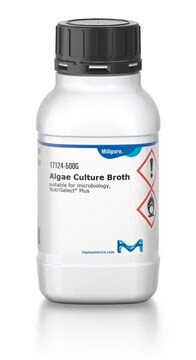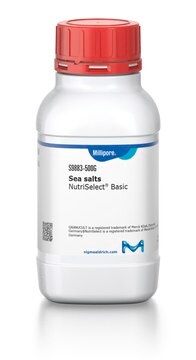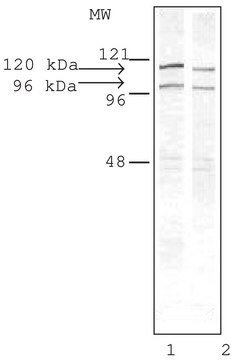G0154
Guillard′s (F/2) Marine Water Enrichment Solution
50 ×, liquid, suitable for plant cell culture
Synonyme(s) :
seawater medium
About This Item
Produits recommandés
Stérilité
sterile-filtered
Niveau de qualité
Forme
liquid
Concentration
50 ×
Technique(s)
cell culture | plant: suitable
Application(s)
agriculture
Conditions d'expédition
dry ice
Température de stockage
−20°C
Catégories apparentées
Description générale
Application
- for culturing Chromera velia CCMP2878 to study coral response to Chromera infection
- to enrich Baltic Sea water to culture unialgal stock of Symbiodinium strains
- as a supplement in water culture medium to culture Chaetoceros affinis (CA) inoculum
Variante de formule
Reconstitution
Produit(s) apparenté(s)
Code de la classe de stockage
12 - Non Combustible Liquids
Classe de danger pour l'eau (WGK)
WGK 1
Point d'éclair (°F)
Not applicable
Point d'éclair (°C)
Not applicable
Listes réglementaires
Les listes réglementaires sont principalement fournies pour les produits chimiques. Seules des informations limitées peuvent être fournies ici pour les produits non chimiques. L'absence d'indication signifie qu'aucun des composants n'est répertorié. Il incombe à l'utilisateur de s'assurer de l'utilisation sûre et légale du produit.
EU REACH Annex XVII (Restriction List)
Certificats d'analyse (COA)
Recherchez un Certificats d'analyse (COA) en saisissant le numéro de lot du produit. Les numéros de lot figurent sur l'étiquette du produit après les mots "Lot" ou "Batch".
Déjà en possession de ce produit ?
Retrouvez la documentation relative aux produits que vous avez récemment achetés dans la Bibliothèque de documents.
Les clients ont également consulté
Protocoles
Phycology media can be prepared from concentrated solutions or from powdered salt mixtures. The concentrated solutions are complete, including vitamins, and should be stored frozen.
Notre équipe de scientifiques dispose d'une expérience dans tous les secteurs de la recherche, notamment en sciences de la vie, science des matériaux, synthèse chimique, chromatographie, analyse et dans de nombreux autres domaines..
Contacter notre Service technique







